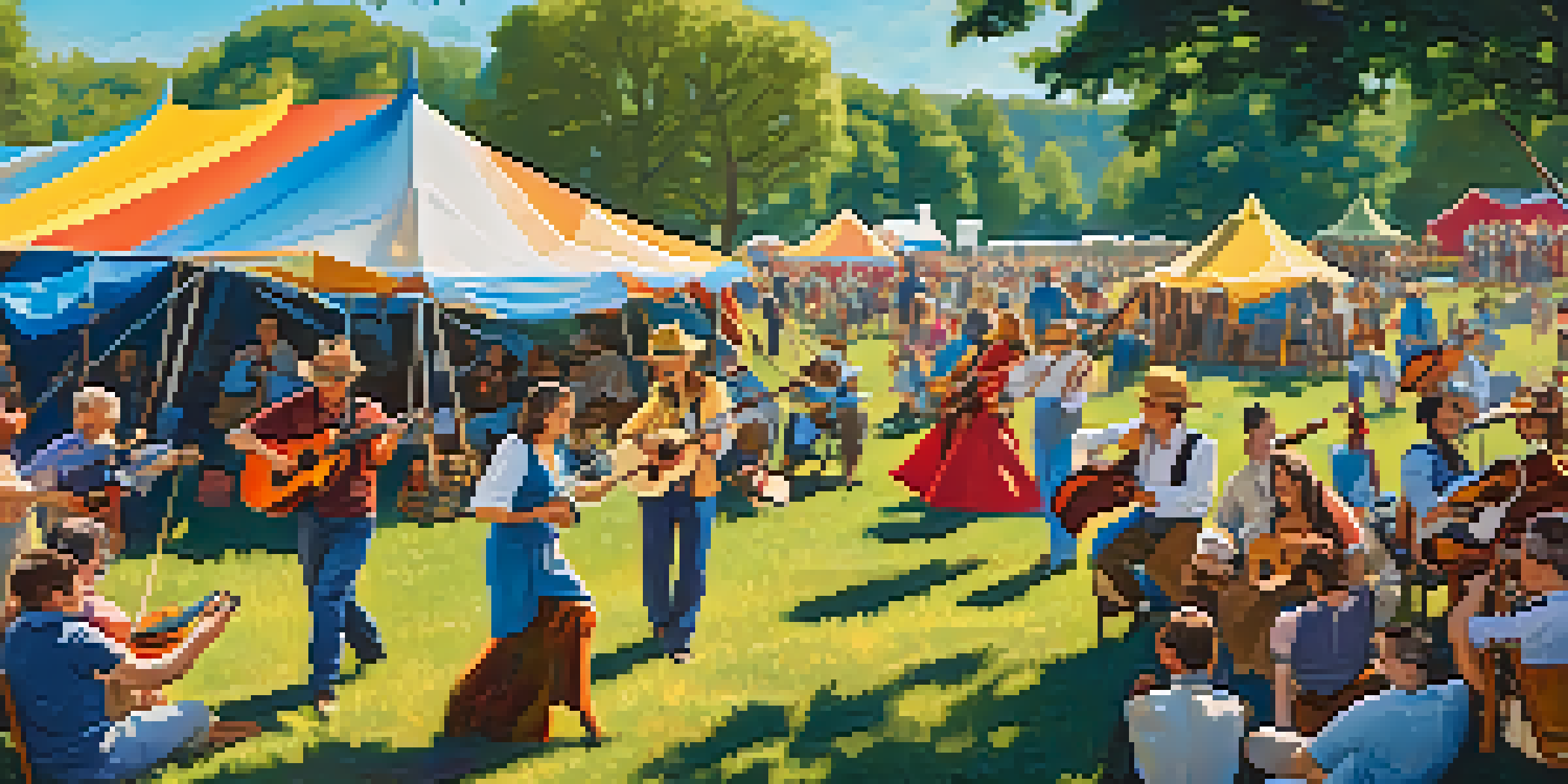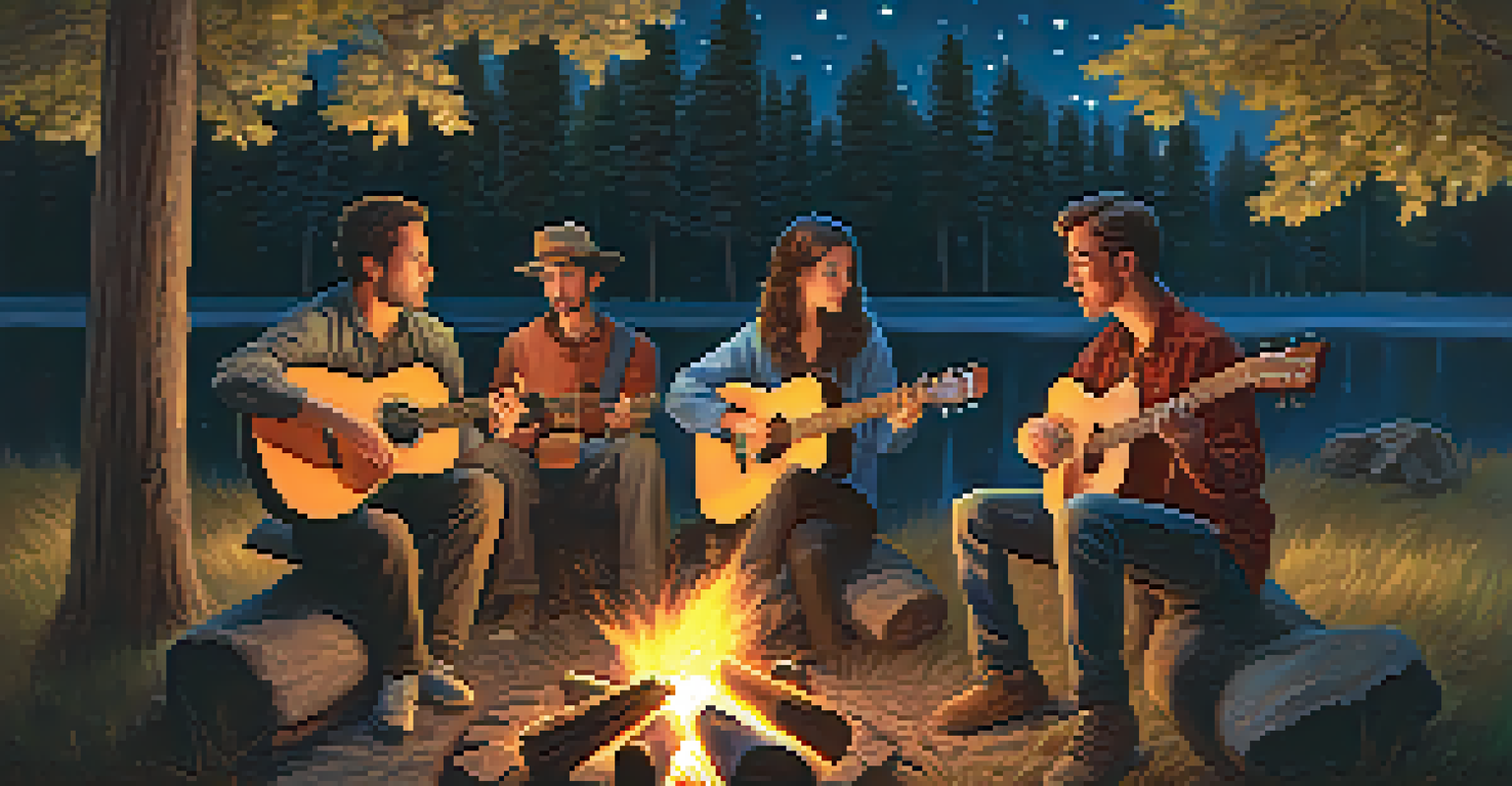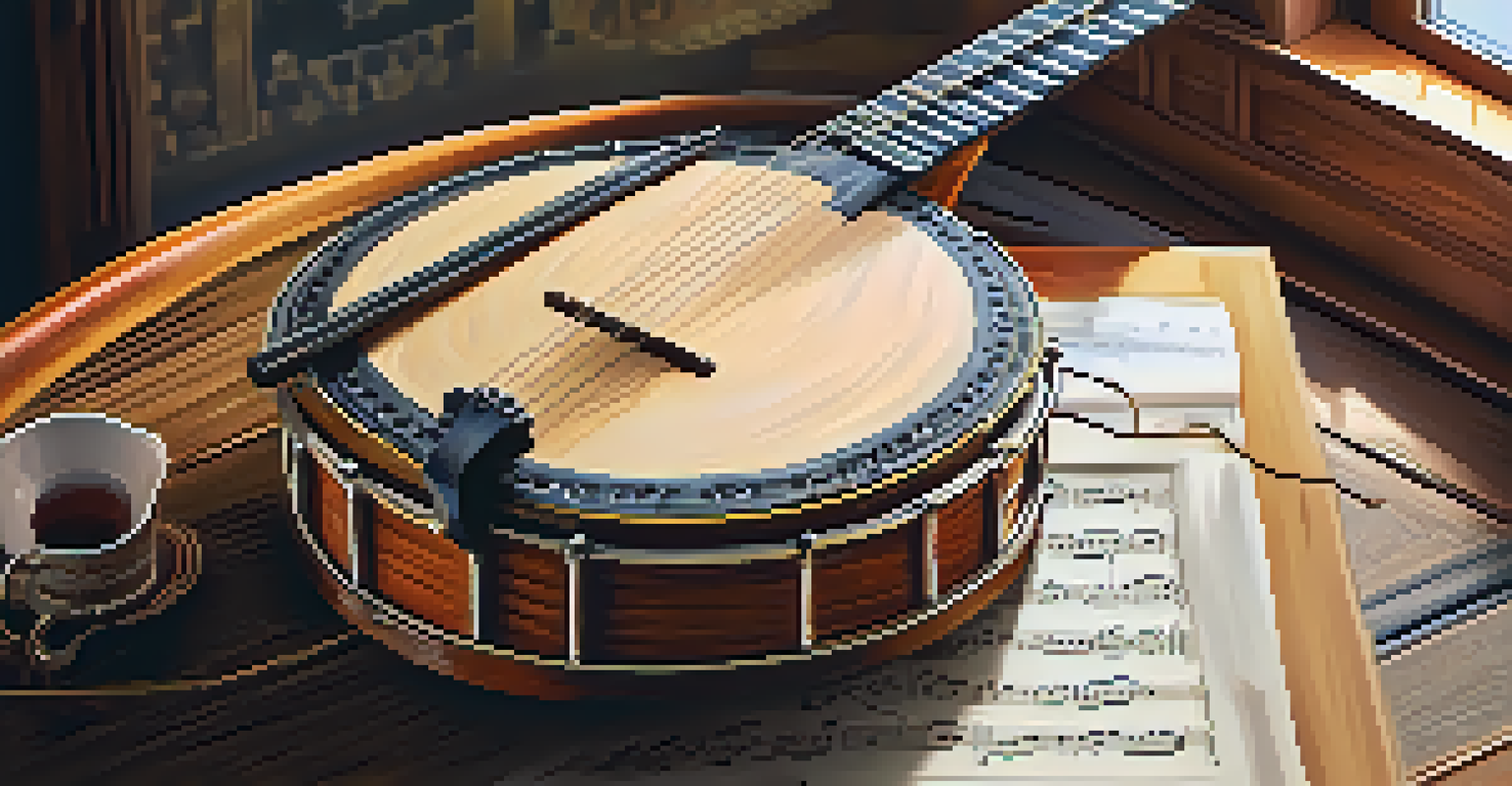Folk Music Revival: Traditional Sounds in Modern Contexts

Understanding Folk Music and Its Roots
Folk music is the heartbeat of culture, often passed down through generations. It embodies stories, struggles, and celebrations of everyday life. Traditionally, these melodies have been rooted in specific communities, using simple instruments and relatable lyrics to connect people.
Folk music is the soundtrack of our lives, a reflection of our shared experiences and cultural heritage.
The essence of folk music lies in its authenticity and the way it reflects the human experience. It’s about sharing tales that resonate, whether it’s about love, loss, or the beauty of nature. This genre often draws from the local dialects and traditions, giving it a unique flavor that varies from one region to another.
In recent years, there’s been a resurgence of interest in folk music, often referred to as the 'folk revival.' This movement seeks to honor and preserve the sounds of the past while bringing them into contemporary contexts, creating a bridge between generations.
The Role of Technology in Folk Music Revival
Technology has played a pivotal role in the revival of folk music, making it more accessible than ever. With platforms like YouTube, Spotify, and social media, artists can share their music with global audiences, breaking geographical barriers. This democratization of music allows traditional sounds to reach new listeners who may have never encountered them otherwise.

Recording technology has also transformed how folk music is produced and consumed. Artists can create high-quality recordings in home studios, allowing for experimentation with sound and style. This blending of traditional and modern techniques results in innovative music that retains its folk essence while appealing to contemporary tastes.
Folk Music Reflects Cultural Heritage
Folk music serves as a vibrant expression of cultural identity, sharing stories and traditions that connect generations.
Moreover, online communities foster collaboration among folk musicians across the world. These virtual spaces encourage sharing, learning, and even fusing genres, which can lead to exciting new interpretations of classic folk tunes, thus keeping the genre alive and evolving.
Influence of Folk Music on Modern Genres
Folk music's influence can be heard across various modern genres, often enriching them with depth and narrative. For instance, artists in pop and rock frequently incorporate folk elements, blending acoustic instruments and storytelling lyrics. This fusion creates a unique sound that appeals to a broader audience while paying homage to its roots.
Music is the universal language of mankind, and folk music speaks to the heart of our common humanity.
Take Mumford & Sons, for example, who have successfully integrated folk instrumentation into their music, leading to mainstream success. Their songs resonate with listeners who may not typically seek out traditional folk music but find themselves drawn to its heartfelt melodies and relatable themes.
This cross-pollination of styles not only keeps folk music relevant but also showcases its versatility. As modern artists borrow from folk traditions, they help introduce these rich cultural sounds to new generations, ensuring that the stories and emotions embedded in folk music continue to thrive.
Cultural Significance of Folk Music Today
In a world that often feels disconnected, folk music serves as a reminder of our shared humanity. It carries the weight of history and tradition, allowing individuals to connect with their heritage while also exploring new narratives. This cultural significance is particularly evident during festivals and community gatherings, where folk music brings people together.
Many artists today use folk music as a platform for social change, addressing contemporary issues through their songs. By weaving in themes of justice, equality, and environmental concerns, they create a dialogue that resonates with audiences on multiple levels. This ability to address modern challenges while remaining rooted in tradition is what makes folk music so powerful.
Technology Boosts Folk Music Revival
The rise of digital platforms has made folk music more accessible, allowing artists to reach wider audiences and innovate within the genre.
Furthermore, folk music often acts as a vehicle for preserving endangered languages and cultures, ensuring that these voices are not lost to time. Through revitalization efforts, communities are using folk music to celebrate their identities and share their stories, fostering pride and awareness among listeners.
The Role of Festivals in Promoting Folk Music
Folk music festivals play a crucial role in the revival and promotion of traditional sounds. These events gather musicians and fans alike, creating a vibrant atmosphere where folk music can be experienced live. From intimate gatherings to large-scale festivals, these occasions celebrate the richness of folk traditions while introducing new artists to the scene.
Festivals also provide a unique opportunity for emerging artists to showcase their talents alongside established musicians. This sense of community encourages collaboration and innovation, fostering a supportive environment for creativity to flourish. Attendees often leave with a deeper appreciation for the genre, inspired by the performances and the stories shared.
Moreover, folk festivals often feature workshops, panel discussions, and storytelling sessions that engage audiences beyond just music. These elements help demystify folk traditions and educate attendees about their cultural significance, ensuring that the legacy of folk music continues to inspire future generations.
Incorporating Folk Music into Everyday Life
Incorporating folk music into everyday life can enrich personal experiences and foster connections. Whether it’s playing a folk tune on a lazy Sunday morning or sharing a playlist with friends, these melodies can set a comforting, nostalgic mood. Folk music has a way of grounding us, reminding us of simpler times and shared experiences.
Many people find that engaging with folk music can inspire creativity in their own lives. From songwriting to storytelling, the themes and narratives found in folk traditions can ignite the imagination. This connection often motivates individuals to explore their own cultural heritage and express their stories through art.
Folk Music Promotes Social Change
Contemporary folk artists use their music to address social issues, fostering dialogue and community engagement through powerful narratives.
Additionally, folk music can serve as a catalyst for community-building. Organizing local jam sessions or sing-alongs can create opportunities for connection among neighbors and friends. It’s a way to gather, share, and celebrate the diverse stories that make up our shared human experience.
The Future of Folk Music in a Globalized World
As we look to the future, the evolution of folk music in a globalized world is both exciting and challenging. While technology enables wide-reaching connections, it also raises questions about cultural appropriation and authenticity. It’s essential for artists and audiences alike to approach folk traditions with respect and a desire to understand their origins.
The continued blending of genres suggests that folk music will remain a dynamic force in the music landscape. As global influences intertwine with local traditions, new forms of folk music will emerge, reflecting the complexities of modern life. This evolution could lead to a richer, more diverse tapestry of sounds that honors both tradition and innovation.

Ultimately, the future of folk music will depend on our collective commitment to preserving its roots while embracing change. By fostering environments that celebrate cultural exchange and storytelling, we can ensure that folk music remains a vital part of our cultural heritage for generations to come.